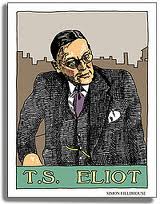Introduction
Thomas Stearns Eliot (1888-1965) originally entitled this poem “Prufrock among the Women.” He changed the title to “The Love Song of J. Alfred Prufrock” before publishing the poem in Poetry magazine in 1915.The words “Love Song” seem apt, for one of the definitions of love song is narrative poem. And, of course, “The Love Song of J. Alfred Prufrock” is a narrative, presenting a moment in the life of the title character. It is also a poem. In addition, the work has characteristics of most love songs, such as repetition (or refrain), rhyme, and rhythm. It also focuses on the womanly love that eludes Prufrock. Eliot took the last name of the title character from a sign advertising the William Prufrock furniture company, a business in Eliot’s hometown, St. Louis, while he was growing up. The initial J. and name Alfred are inventions, probably mimicking the way Eliot occasionally signed his name as a young adult: T. Stearns Eliot.
The poem centers on a balding, insecure middle-aged man. He expresses his thoughts about the dull, uneventful, mediocre life he leads as a result of his feelings of inadequacy and his fear of making decisions. Unable to seize opportunities or take risks (especially with women), he lives in a world that is the same today as it was yesterday and will be the same tomorrow as it is today. He does try to make progress, but his timidity and fear of failure inhibit him from taking action. The action takes place in the evening in a bleak section of a smoky city. This city is probably St. Louis, where Eliot (1888-1965) grew up. But it could also be London, to which Eliot moved in 1914. However, Eliot probably intended the setting to be any city anywhere. The speaker of this ironic monologue is a modern, urban man who, like many of his kind, feels isolated and incapable of decisive action. Irony is apparent from the title, for this is not a conventional love song. Prufrock would like to speak of love to a woman, but he does not dare. The poem opens with a quoted passage from Dante’s inferno, suggesting that Prufrock is one of the damned and that he speaks only because he is sure no one will listen. Since the reader is overhearing his thoughts, the poem seems at first rather incoherent. But Prufrock repeats certain phrases and returns to certain core ideas as the poem progresses. The “you and I” of the opening line includes the reader, suggesting that only by accompanying Purfrock can one understand his problems.
The images of the opening lines depict a drab neighborhood of cheap hotels and restaurants, where Prufrock lives in solitary gloom. In line 12 he suggests making a visit, and immediately his mind calls up an image of the place he and the reader will go– perhaps an afternoon tea at which various women drop in and engage in polite chitchat about Michelangelo, who was a man of great creative energy, unlike Prufrock.
The next stanza creates an image of the dull, damp autumn evening when the tea party will take place. In the rest of the poem Prufrock imagines his arrival, his attempt to converse intimately with the woman whose love he seeks, and his ultimate failure to make her understand him. Prufrock has attended such parties many times and knows how it will be, and this knowledge makes him hesitate out of fear that any attempt to push beyond mere polite conversation, to make some claim on the woman’s affections, will meet with a frustratingly polite refusal. So Prufrock simultaneously plans his approach and tells himself that he can put off the action. The phrase “There will be time,” repeated five times between lines 23 and 36, represents his hesitation and delay. When he says in lines 44 and 45 “Do I dare/ Disturb the universe?,” the universe he is referring to is his small social circle of middle-class acquaintances. He would disturb its equilibrium if he actually tried to sing a “love song” to one of them. He already “knows them all” and knows that they do not expect much from him. He tries, starting at line 70, to rehearse a speech he might make to one particular woman, but he gives up almost as soon as he has started, saying that it would be better to be merely a crab rather than a human being who has to make love speeches and ask for affection.
Deciding not to try, Prufrock questions whether his efforts would have been worthwhile. He excuses his fear by rationalizing that his speaking to the woman would not have achieved any real response. In line 110 Prufrock contrasts himself to Hamlet, a hero who hesitated but finally acted decisively. But Prufrock sees himself as more like Polonius, the old fool from the same play. Prufrock will retreat into a solitary, dignified old age. He has gone past dreams of romance into the sober but empty existence of a passionless old man.
For many readers in the 1920s, Prufrock seemed to epitomize the frustration and impotence of the modern individual. He seemed to represent thwarted desires and modern disillusionment. Prufrock’s weaknesses could be mocked, but he is a pathetic figure, not grand enough to be tragic. The sense of the unheroic nature of life in the twentieth century such phrases as —
For I have known them all already, known them all-
Have known the evenings, mornings, afternoons,
I have measured out my life with coffee spoons; (lines: 49-51)
“Prufrock” ends with the hero assigning himself a role in one of Shakespeare’s plays: While he is no Hamlet, he may yet be useful and important as “an attendant lord, one that will do / to swell a progress, start a scene or two…” This implies that there is still continuity between Shakespeare’s world and ours, that Hamlet is still relevant to us and that we are still part of a world that could produce something like Shakespeare’s plays. Implicit in this, of course, is the suggestion that Eliot, who has created an “attendant lord,” may now go on to create another Hamlet. While “Prufrock” ends with a devaluation of its hero, it exalts its creator. Or does it? The last line of the poem suggests otherwise–that when the world intrudes, when “human voices wake us,” the dream is shattered: “we drown.” With this single line, Eliot dismantles the romantic notion that poetic genius is all that is needed to triumph over the destructive, impersonal forces of the modern world. In reality, Eliot the poet is little better than his creation: He differs from Prufrock only by retaining a bit of hubris, which shows through from time to time. Eliot’s poetic creation, thus, mirrors Prufrock’s soliloquy: Both are an expression of aesthetic ability and sensitivity that seems to have no place in the modern world. This realistic, anti-romantic outlook sets the stage for Eliot’s later works, including The Waste Land.
J.Alfred Prufrock as a Modern Man
“The Love Song of J. Alfred Prufrock” contains T.S. Eliot’s perception on modern man. The narrator of the poem, J. Alfred Prufrock, represents Eliot’s depiction of modern man. Eliot explains his reasons for writing about this topic by saying, “Poetry may help to break up the conventional modes of perception and valuation which are perpetually forming, and make people see the world afresh, or some new part of it. It may make us from time to time a little more aware of the deeper, unnamed feelings which form the substratum of our being, to which we rarely penetrate; for our lives are mostly a constant evasion of ourselves, and an evasion of the visible and sensible world. But to say all this is only to say what you know already, if you have felt poetry and thought about your feelings.” Eliot personally feels that modern man has an exiguous view on the quality of life and the truly important entities. His character, J. Alfred Prufrock, represents all aspects of modern man that! Eliot despises. For example, Prufrock is obsessed with appearance and age and he exhibits deficient communication skills.
All three of these fixations lead Prufrock to individual isolation, perpetual loathing of mankind. Even though he has overcome his problem with his love life, he still! Have many other worries with which to contend. His existence is solitary and boring while their state is fun and exciting. The fact that the younger generation is constantly “examining him”, bothers Prufrock a great deal. “His only happiness, found in daydreams, collapses at the slightest altercation. Prufrock sees his age as the end of his romantic zeal and assumes the response to his love, from any woman, will be cruel and heartless. “But how his arms and legs are thin!”” Prufrock’s insecurity indisputably hinders him. “The rich on the other hand are educated and enjoy life every day. It holds him back from doing the things he wishes to do. The lower class lived a meager, dull and predictable life. Expressing any kind of affection to her is awkward and difficult for him. “He can hear the voices of his neighbors but he cannot go to them. They spend “restless nights in one-night cheap hotels.
In T.S. Eliot’s “The Love Song of J. Alfred Prufrock,” the author is establishing the trouble of the main character, Prufrock, who is having coming to his middle age. He is deeply distressed over the fact that he is growing old, and feels that the prime of his life has passed him by. His preoccupation with time throughout the poem characterizes his fear of aging. He is a man experiencing a mid-life crisis, brought about by his perception of aging and his own feelings of inadequacy. J. Alfred Prufrock is a man caught in a trap of constant introspection and indecision. “And time yet for a hundred indecisions, and for a hundred visions and revisions.”(32, 33) He has no confidence in himself mentally or physically. He can not make a decision and act on it because of his feelings of inadequacy and his fear of rejection. Although Alfred is presumably affluent, He still fears that society will judge him because of his balding head and thin, aging body. “With a bald spot in the middle of my hair—(they will say: “How his hair is growing thin!”) My morning coat, my collar mounting firmly to my chin, my necktie rich and modest, but asserted by a simple pin,
They will say: “But how his arms and legs are thin!”(39-43)
Eliot uses the reference of time often in order to show the state of mind of Prufrock. The repeti-tion of words like vision and revision exemplify his obsession with time and his indecisiveness.
Prufrock’s paralysis follows naturally from this subjectivizing of everything.If each conscious-ness is an opaque sphere, then Prufrock has no hope of being understood by others. Prufrock’s vision is incommunicable, and whatever he says to the lady will be answered by,
“That is not what I meant at all.
That is not it, at all” (Lines: 97-98).
The lady is also imprisoned in her own sphere, and the two spheres can never, like soap bubbles, become one. Each is impenetrable to the other. If other consciousnesses exist only as opaque objects for Prufrock, he has an equally unhappy relation to time and space. One of the puzzles of the poem is the question as to whether Prufrock ever leaves his room. It appears that he does not, so infirm is his will, so ready-
“For a hundred indecisions,
And for a hundred visions and revisions,
Before the taking of a toast and tea” (Lines: 32-34).
In another sense Prufrock would be unable to go anywhere, however hard he tried. If all space has been assimilated into his mind, then spatial movement would really be movement in the same place, like a man running in a dream. There is no way to distinguish between actual movement and imaginary movement. However far Prufrock goes, he remains imprisoned in his own subjective space, and all his experience is imaginary. It seems to be some perception of this which keeps him in his room, content to imagine he going through the streets, ascending the lady’s stair, and telling her “all,” like Lazarus back from the dead. There is no resurrection from the death which has undone him, and this is one meaning of the epigraph from Dante.
Time disappears in the same way. Space must be exterior to the self if movement through it is to be more than the following of a tedious argument in the mind. In the same way only an objective time can be other than the self, so that the flow of time can mean change for that self. But time, like space, has only a subjective existence for Prufrock. As a result, past, present, and future are equally immediate, and Prufrock is paralyzed. Like one of Bradley’s finite centers, he “is not in time,” and “contains [his] own past and future” (KE, 205). Memories, ironic echoes of earlier poetry, present sensations, anticipations of what he might do in the future,
“I grow old . . . I grow old . . .
I shall wear the bottoms of my trousers rolled”(Lines: 119-120).
These are equally present. There is a systematic confusion of tenses and times in the poem, so that it is difficult to tell if certain images exist in past, present, and future. Prufrock begins by talking of his visit to the lady as something yet to be done, and later talks of his failure to make the visit as something long past (“And would it have been worth it, after all,/Would it have been worth while” (CP, 61). Like the women talking of Michelangelo, he exists in an eternal present, a frozen time in which everything that might possibly happen to him is as if it had already happened:
“For I have known them all already, known them all” (Lines: 49)
In this time of endless repetition Prufrock cannot disturb the universe even if he should presume to try to do so. Everything that might happen is foreknown, and in a world where only one mind exists the foreknown has in effect already happened and no action is possible. Prufrock’s infirmity of will is not so much a moral deficiency as a consequence of his subjectivism.
T. S. Eliot’s “The Love Song of J. Alfred Prufrock” is not a poem about love, at least in any traditional sense. Rather It is a collection of the fragmented thoughts of a man without self-esteem. Far from being about love, it is about one man’s inability to love (himself or the world around him.) It is the cynical statement of a man who does not believe good things will ever happen to him, or that the world has anything to offer him. The title is bitterly ironic; Prufrock does not love any body, least of all himself, (no matter how much he might aspire to the ideal of romance and passion), nor does he believe that any one could ever love him.
His own life is devoid of love, so in his bitterness he brands his work a “love song”.
Although the poem addresses the reader directly, saying, “Let us go then, you and I,”1 Prufrock is really just talking to himself. His is a tale of shame and insecurity that he would never dare share with another human being. The epigraph graphically illustrates this; being a passage from Dante’s.In his poem “The Love Song of J. Alfred Prufrock,” T.S. Eliot subtly conveys a wide variety of Prufrock’s emotions; he creates pathos for the speaker by employing the “objective correlative,” which Eliot defines as “a set of objects, a situation, a chain of events [that] shall be the formula of that particular emotion” (“Hamlet and His Problems”).
The first stanza introduces Prufrock’s isolation, as epitomized metaphorically by “half-deserted streets” (4): while empty streets imply solitude, Eliot’s diction emphasizes Prufrock having been abandoned by the other “half” needed for a relationship or an “argument” (8). Hoping for a companion, Prufrock speaks to the reader when saying, “Let us go then, you and I” (1), as he needs to address his lament to an audience; conscious of the reader’s curiosity regarding the “overwhelming question,” (10) Prufrock answers, “Oh, do not ask, ‘What is it?’” (11).likely explanation for Eliot’s inconsistent use of you in this stanza is Prufrock probably meaning you.
The Love Song of J. Alfred Prufrock is a uniquely styled piece of literature. In this poem Eliot employs a literary method of writing called “stream of consciousness.” This is a difficult method to grasp outside of the literary genre to attempt to understand it within the context of the higher language of poetry can further confuse readers.
Stream of consciousness is simply how our brain thinks. Perhaps as the teacher reads through this poem we hear the word “Mermaid”. Our minds see the singing mermaids on the rocks in “Jason and the Argonauts” and then jump to Peter Pan and from Peter Pan to Mary Poppins. The idea of stream of consciousness is comparable to channel surfing; there are no logical traceable transitions. We simply switch from one thing/idea to the next. This is idea of stream of consciousness is seen in the manner in which the author sets the poem.
There is a difference between the way Prufrock sees himself, and the way the poem reveals him to us. He dramatises himself as a sensitive and slightly tragic figure; the poem exposes him as comic”. Does this correspond to your own reading of ‘The Love Song of J. Alfred Prufrock’? In the poem ‘The Love Song of J. Alfred Prufrock’, Prufrock sees himself as a victim social status. He believes that he is constantly being analysed by others and that he has been alienated from society. However Prufrocks way of life is not comic, but is rather the opposite: in that he is insecure; unable to make clear decisions; melodramatic and reserved. It is clear that in order to get what he wants, Prufrock has to be realistic, accept his life and his personality. In the poem, Prufrocks main interest lies in the upper class women, ‘in the room the women come and go/ Talking of Michelangelo.’. He is also struggling to leave his previous life behind him, to join the more cultured and civilized society. The frequently repeated question ‘How should I presume?’ demonstrates that Prufrock believes he is attempting to presume a status which isn’t rightfully his. Thus he regards himself as a victim of social status, who is unable to alter his standing I.
It is for this reason that he ‘prepares a face to meet the faces that you meet’, and uses it throughout the poem. Yet he still feels as though his life is inadequate in comparison to theirs, just as a coffee spoon alone is inadequate for the taking of afternoon tea, as more utensils are required. The best example of his self-consciousness is found when he says —
“My morning coat, my collar mounting firmly to the chin,
My necktie rich and modest, but asserted by a simple pin,
They will say: But how his arms and legs are thin!” (Lines: 41-43)
This view is also evident in the lines,
‘No! I am not Prince Hamlet, nor was meant to be;
Am an attendant lord’, (Lines: 111-112)
Where Prufrock downsizes his role in society, saying that he is destined to remain a minor character, and is unable to take on a major role in society. ‘And believes that although he has opinions and knowledge, society has prevented him from expressing himself, by causing him to feel foolish when he does so. He is under the impression that he can only live peacefully in his fantasies, at least ‘Till human voices wake us, and we drown. Prufrock expresses a desire to become a crab, as they, too, are scared and often overwhelmed. It is clear that Prufrock is indecisive, as can be seen in the fact that he takes an abnormally long time to decide wether or not to ask his important question. He repeatedly asks himself ‘Do I dare?’, as he is wondering wether or not to ask the question. Have the strength’ and ‘I have seen the moment of my greatness flicker. In this quote Prufrock has even gone so far as to say that he is not human. This can be seen in the lines,
“I should have been a pair of ragged claws
Scuttling across the floors of silent seas.” (Lines: 73-74)
Being an earlier creation, Prufrock is perhaps more hopeful than Meursault. But he wavers and admits to uncertainty. He too suffers from the existential plight of indecision, asking,
“So how should I presume?
And how should I begin?” (Lines 68-69)
Escape from the hell that surrounds him lies in a realization of the truth of existence. His quest and its realization are similar to Meursault’s. His fate therefore is equally tragic.
On looking at these characters together, one is surprised by their startling psychological resem-blance. Though temporally separated, Prufrock and Meursault are essentially similar. From our comparison Meursault’s character is revealed as a development on that of Prufrock, so that despite their differences they seem to be parallel examples of the outsider.
‘The Love Song of J. Alfred Prufrock”, he continues this theme allowing the reader to view the world as he sees it, a world of isolation and fear strangling the will of the modern man. The poem opens with a quoted passage from Dante’s Inferno, an allusion to Dante’s character who speaks from Hell only because he believes that the listener can not return to earth and thereby is impotent to act on the knowledge of his conversation. In his work, Eliot uses this quotation to foreshadow the idea that his character, Prufrock, is also trapped in a world he can not escape, the world where his own thoughts and feelings incapacitate and isolate him. Eliot paints a picture of the opening scene that depicts a drab neighborhood of cheap hotels and restaurants where Prufrock lives in his solitary gloom. He invites the reader to make a visit with him to a place that Prufrock imagines is filled with women having tea and engaging in conversation. Prufrock procrastinates on the visit and says,
‘There will be time, there will be time
To prepare a face to meet the faces that you meet:’ (Lines 26-27)
Indicating to the reader that he is afraid of showing his real self to these participants.
Life& Works:
Thomas Stearns Eliot (26 September 1888 – 4 January 1965), American-British poet and literary critic, author of Prufrock and Other Observations (1917) won numerous awards and honors in his lifetime, including the Nobel Prize for Literature in 1948. His early and experimental poetical works depict a bleak and barren soullessness, often in spare yet finely crafted modern verse;
LET us go then, you and I,
When the evening is spread out against the sky
Like a patient etherised upon a table;
Let us go, through certain half-deserted streets,
The muttering retreats
Of restless nights in one-night cheap hotels
And sawdust restaurants with oyster-shells:
Streets that follow like a tedious argument
Of insidious intent
To lead you to an overwhelming question …
Oh, do not ask, “What is it?”
Let us go and make our visit. (Lines: 1-12)
–-from “The Love Song of J. Alfred Prufrock”
Another of his famous and oft-quoted works, The Waste Land (1922) deals with dark and haunting themes of individual consciousness and spiritual desolation against the decline of civilisation. Conrad’s Heart of Darkness comes to mind as Eliot innovatively rejects traditional Romantic ideals through allusion and symbolism. From the first line “April is the cruellest month..” to the last “Shantih shantih shantih” we can intuit the dramatic scope and evolution of Eliot’s own life in the Biblical, cultural, historical, and literary references that helped shape one of the 20th century’s most profound figures in literature.
Thomas Stearns Eliot was born 26 September 1888 in St. Louis, Missouri, the son of Charlotte Stearns and Henry Ware Eliot. He attended HarvardUniversity before studying philosophy at the Sorbonne in Paris, earning a B.A. and M.A. in English Literature. In 1914 he settled in England and worked as a schoolmaster and eventually met and became friends with many popular writers of the time including Ezra Pound. In 1915 he married Vivien Haigh Wood (they would separate in 1933). Around the time he was working with Lloyds Bank of London he also started editing the Egoist (1917–1919). Soon after he was publishing his own quarterly literary journal Criterion which would become one of the most acclaimed publications of the genre. In 1925, busy working with the publishing house Faber and Faber he also continued to write many poems and essays. In 1927 he entered the Anglican Church and became a British subject. He also wrote many plays including The Rock: A Pageant Play (1934); Murder in the Cathedral (1935); The Family Reunion (1939); The Cocktail Party (1950); The Confidential Clerk (1954); and The Elder Statesman (1959). In 1957 he married Valerie Fletcher. Collections of his plays include; Poems (1920); Poems 1909-1925 (1925); Ash Wednesday (1930); Four Quartets (1935–42); On Poetry and Poets (1957); Collected Poems 1909-1962 (1963).Eliot’s vast collection of critical works include; The Sacred Wood (1920); For Lancelot Andrew’s (1928); Selected Essays, 1917–32 (1932); The Use of Poetry and the Use of Criticism (1933); After Strange Gods (1934); Elizabethan Essays (1934); Essays Ancient and Modern (1936); and Notes towards a Definition of Culture (1948).Thomas Stearns Eliot died on 4 January 1965, his ashes interred at the Parish Church of Saint Michael in East Coker, Somerset, England from whence his ancestors came. There is a memorial to Eliot in Poet’s Corner in Westminster Abbey, London, England, his epitaph reading; “The communication of the dead is tongued with fire beyond the language of the living”
















